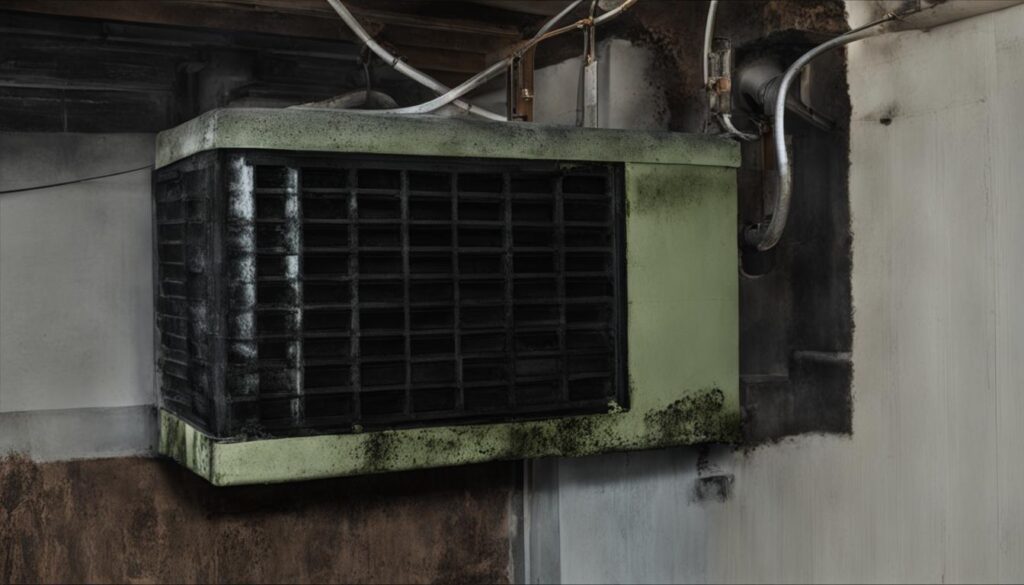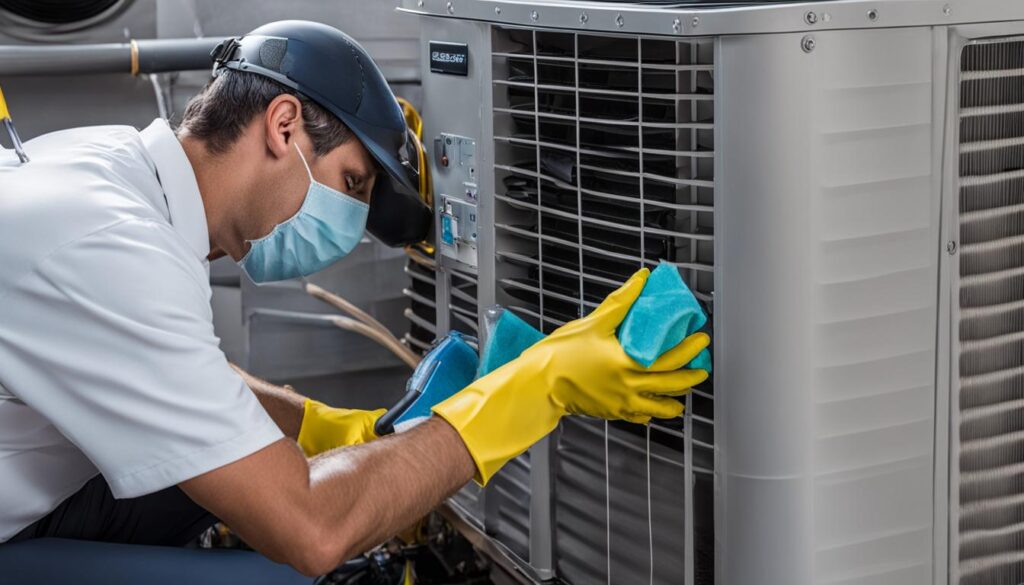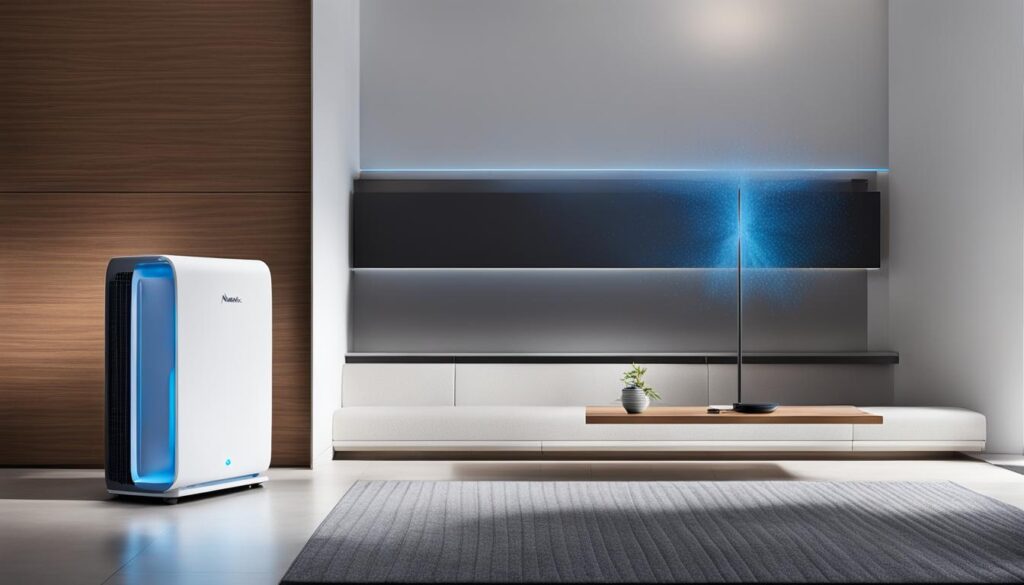If you’ve noticed a musty smell coming from your AC unit, it’s important to understand the potential causes and how to address them. Musty smells can be caused by factors such as dirt and debris buildup on coils and filters, mold or mildew growth in vents or ducts, a full drain pan, frozen evaporator coils, a clogged drain line, or even an incorrectly sized AC unit. By identifying the source of the musty smell and taking appropriate action, you can freshen up your AC unit and improve your indoor air quality.
Key Takeaways:
- Musty smells from AC units can have various causes, including dirt and debris buildup, mold or mildew growth, or issues with drainage and sizing.
- Regular cleaning and maintenance of your AC unit, including coil and filter cleaning, can help eliminate musty odors.
- If you suspect mold or mildew growth, it’s important to address it promptly to prevent further odor issues.
- Frozen evaporator coils and clogged drain lines can contribute to musty smells and should be addressed by a professional.
- Proper sizing of your AC unit is crucial to prevent inadequate cooling and associated odor problems.
Causes of a Musty Smell in Your AC Unit
If you’ve noticed a musty odor coming from your air conditioner, it’s important to understand the potential causes and how to address them. The musty smell in your AC unit can be caused by various factors, including:
- Buildup of dirt, dust, and debris on the coils and filters, creating a breeding ground for mold and mildew.
- Mold and mildew growth in the vents or ducts, contributing to the musty odor.
- A full drain pan or a clogged drain line, resulting in standing water and a musty smell.
- Incorrectly sized AC unit, leading to insufficient cooling and increased humidity levels, which can cause mold and mildew growth and a musty smell.
Identifying the specific cause of the musty smell in your AC unit is crucial in effectively removing the odor and preventing it from returning. By addressing the underlying issues, you can freshen up your AC unit and improve your indoor air quality.
| Cause | Description | Solution |
|---|---|---|
| Dirt, dust, and debris buildup on coils and filters | Creates a breeding ground for mold and mildew | Clean coils and filters regularly to remove build-up |
| Mold and mildew growth in vents or ducts | Contributes to the musty odor | Hire a professional to clean vents and ducts |
| Full drain pan or clogged drain line | Results in standing water and a musty smell | Clean or unclog drain pan and drain line |
| Incorrectly sized AC unit | Causes insufficient cooling and increased humidity levels | Consult with an HVAC technician to determine the appropriate size and consider replacement if necessary |
By addressing these causes and taking appropriate action, you can eliminate the musty smell and ensure your AC unit operates efficiently, providing you with a fresh and pleasant indoor environment.
Cleaning and Maintenance Tips to Remove Musty Smell
Regular cleaning and maintenance of your AC unit are essential in eliminating the musty smell and ensuring optimal performance. Follow these tips to freshen up your AC unit and improve indoor air quality:
- Clean the Coils and Filters: Dirty coils and filters can trap dirt, dust, and debris, creating a breeding ground for mold and mildew. Use manufacturer-recommended cleaning techniques and products or hire a professional HVAC technician for coil cleaning. Regularly changing the AC filters is also crucial in maintaining a fresh-smelling unit.
- Check the Drain Pan and Drain Line: A full drain pan or a clogged drain line can lead to standing water and a musty smell. Inspect the drain pan for any debris or water accumulation and clean or empty it as necessary. Similarly, unclog the drain line if you notice any blockages. A clear drain line prevents moisture buildup and helps eliminate odors.
- Schedule Professional Maintenance: Regularly scheduling professional HVAC maintenance can keep your AC unit in top condition. During these visits, technicians can inspect the unit, identify any potential issues, and clean components that are difficult to access on your own. Professional maintenance helps prevent mold and mildew growth, ensuring a fresh-smelling AC unit.
By following these cleaning and maintenance tips, you can eliminate the musty smell and enjoy a fresh and efficient AC unit.
Dealing with Mold and Mildew Growth
If you suspect mold or mildew in your AC unit, it’s important to take action to remove the growth and eliminate the musty odor. Mold and mildew can thrive in dark, damp environments, making your AC unit an ideal breeding ground. To address this issue, it’s recommended to hire a professional HVAC technician who specializes in mold remediation.
The technician will conduct a thorough inspection of your vents, ducts, and air handler to identify any areas affected by mold or mildew. They will then implement a comprehensive cleaning and sanitization process to remove the mold and eliminate the odor. This may involve using specialized cleaning solutions and equipment to ensure effective mold removal.
It’s also important to address any underlying moisture issues that may have contributed to the mold growth. The technician can help identify and resolve these issues, such as leaks or excessive humidity levels, to prevent future mold and mildew problems. By tackling both the mold growth and the root cause, you can eliminate the musty smell and improve the overall air quality in your home.

Addressing Frozen Evaporator Coils and Clogged Drain Line
If you’ve noticed a musty smell coming from your AC unit, it’s possible that frozen evaporator coils or a clogged drain line may be contributing to the odor. Frozen evaporator coils can occur when there is a lack of airflow or a refrigerant issue, causing moisture to freeze on the coils. This can result in reduced cooling efficiency and a musty smell. Similarly, a clogged drain line can lead to standing water, which creates the perfect conditions for mold and mildew growth, resulting in an unpleasant odor.
To address frozen evaporator coils, it’s important to turn off your AC unit at the thermostat and power source. You should then contact a professional HVAC repair technician to diagnose and resolve the issue. They will be able to identify the root cause of the freezing and ensure that your unit is running efficiently.
If you suspect a clogged drain line, check for signs of standing water near your indoor unit. This could indicate a blockage in the drain line. In this case, it’s best to contact a professional to clean or unclog the drain line. They will have the necessary tools and expertise to remove any obstructions and help prevent further issues.
| Frozen Evaporator Coils | Clogged Drain Line |
|---|---|
| – Reduced cooling efficiency | – Standing water near indoor unit |
| – Musty smell | – Mold and mildew growth |
| – Lack of airflow | – Blockage in drain line |
If you’re experiencing a musty smell and suspect frozen evaporator coils or a clogged drain line, it’s best to seek professional help. Attempting to address these issues without the necessary knowledge and tools can result in further damage to your AC unit. HVAC technicians have the expertise to diagnose and resolve these problems effectively, ensuring that your AC unit is operating efficiently and odor-free.
Ensuring Proper AC Unit Sizing
Proper AC unit sizing is crucial in maintaining optimal cooling performance and preventing a musty smell in your central air conditioning unit. When your AC unit is too big for your home, it cools the space quickly, but doesn’t run long enough to remove excess humidity. This can result in a damp environment that promotes mold and mildew growth, leading to a musty odor. On the other hand, an AC unit that is too small will struggle to cool your home efficiently, potentially causing the evaporator coil to freeze and produce a musty smell.
Consulting with an experienced HVAC technician can help determine if your AC unit is the right size for your home. They will assess your home’s cooling needs, taking into account factors such as the square footage, insulation, number of windows, and climate. By properly sizing the AC unit, you can ensure that it runs efficiently, maintains the desired temperature, and effectively removes humidity, reducing the risk of a musty smell.
Table: AC Unit Sizing Guidelines
Use this table as a general guideline to estimate the appropriate AC unit size for your home. Keep in mind that these are approximate values, and it is recommended to consult with an HVAC professional for an accurate assessment.
| Home Size (Square Footage) | AC Unit Size (Tons) |
|---|---|
| Less than 1,000 | 1.5-2 |
| 1,000-1,500 | 2-2.5 |
| 1,500-2,000 | 2.5-3 |
| 2,000-2,500 | 3-3.5 |
| 2,500-3,000 | 3.5-4 |
Remember that factors such as insulation quality, the number of windows and doors, the ceiling height, and the local climate can also impact the appropriate AC unit size. Consider consulting with an HVAC professional to ensure accurate sizing and avoid potential issues related to improper unit size.
Seeking Professional Help
If you’ve tried various cleaning and maintenance methods to address the musty smell in your AC unit but haven’t had success, it may be time to seek the help of a professional HVAC technician. They have the expertise and tools necessary to diagnose and address the underlying issues causing the odor. Whether it’s cleaning the coils, unclogging the drain line, or conducting a thorough inspection of the unit, a professional can ensure that the musty smell is effectively eliminated.
Professional AC unit cleaning is especially important if you suspect mold or mildew growth in your system. Mold and mildew can be stubborn and difficult to remove without professional intervention. An HVAC technician can thoroughly clean the vents, ducts, and air handler to eliminate any mold or mildew and prevent it from spreading further.
Additionally, a professional can provide guidance on preventive measures to keep your AC unit smelling fresh and functioning efficiently. They can recommend proper maintenance practices, such as regular filter changes and professional HVAC maintenance, to prevent issues that can lead to a musty smell. By consulting with a professional HVAC technician, you can ensure the long-term freshness of your AC unit and improve your indoor air quality.

Benefits of seeking professional help:
- Expertise and tools to diagnose and address underlying issues
- Thorough cleaning to eliminate mold and mildew growth
- Guidance on preventive measures for long-term freshness
- Improved indoor air quality
Preventive Measures for a Fresh-Smelling AC Unit
Maintaining a fresh-smelling AC unit not only enhances your indoor air quality but also prolongs the life of your system. By following these preventive measures, you can prevent musty smells and ensure efficient performance:
- Regular AC unit maintenance: Schedule regular maintenance with a professional HVAC technician to clean and inspect your unit. This includes cleaning the coils, checking the drain pan and drain line, and changing air filters every 3 months.
- Proper ventilation: Ensure proper ventilation in your home to prevent moisture buildup, which can lead to mold and mildew growth. Use exhaust fans in high moisture areas such as bathrooms and kitchens.
- Control humidity levels: Use a dehumidifier in humid climates or during humid seasons to keep moisture levels in check. Ideally, indoor humidity levels should be between 30% and 50%.
- Keep the area around the AC unit clean: Remove any debris, leaves, or vegetation around the outdoor unit. This helps maintain proper airflow and prevents the accumulation of dirt and debris on the coils.
By incorporating these preventive measures into your AC unit maintenance routine, you can enjoy a fresh-smelling and efficiently functioning system all year round.
Regular AC Unit Maintenance Checklist
To help you stay on top of your AC unit maintenance, here’s a handy checklist to follow:
| Maintenance Task | Frequency |
|---|---|
| Clean or replace air filters | Every 3 months |
| Clean condenser and evaporator coils | Annually or as recommended by the manufacturer |
| Clean and check the drain pan and drain line | Annually or as needed |
| Inspect and tighten electrical connections | Annually |
| Lubricate moving parts (if applicable) | Annually |
| Check and calibrate thermostat | Annually |
| Inspect ductwork for leaks or damage | Annually |
| Monitor refrigerant levels | Every 2-3 years or as recommended by the manufacturer |
By following this checklist and addressing any issues promptly, you can maintain a fresh-smelling AC unit and ensure optimal performance and energy efficiency.
Nanoe™ X Technology for Odor Control

If you’re looking for an effective solution to prevent bad odors in your AC unit, consider utilizing Nanoe™ X technology. This advanced technology is designed to inhibit the growth of mold, bacteria, and odors, helping to keep your air conditioning system smelling fresh.
Nanoe™ X technology works by generating hydroxyl radicals that bind to substances causing bad smells, effectively deodorizing the air. These hydroxyl radicals are capable of neutralizing odor particles, preventing them from accumulating in your AC unit and circulating throughout your home.
By incorporating an air conditioner equipped with Nanoe™ X technology, you can enjoy a fresher environment and improved indoor air quality. The innovative technology not only eliminates existing odors but also helps to maintain a clean and odor-free AC system over time.
Common Smells and Their Causes
Air conditioners can emit various smells, each with its own potential causes. It’s important to identify the specific smell and its cause in order to effectively resolve the odor issue. Here are some common air conditioner smells and their possible causes:
Mold and Mildew Smells
If your AC unit emits a musty or moldy smell, it could be due to mold or mildew growth. This can occur when there is moisture buildup in the drain pan or on the evaporator coils. Mold and mildew thrive in damp environments, and if left untreated, they can not only cause unpleasant smells but also affect your indoor air quality. To address this issue, it is recommended to clean and disinfect the affected areas and ensure proper drainage.
Gas or Rotten Egg Smells
A gas or rotten egg smell coming from your AC unit could indicate a gas leak. This is a serious issue that requires immediate attention, as it poses a safety hazard. If you detect this smell, it is important to turn off your AC unit, ventilate the area, and contact a professional HVAC technician to inspect and repair any potential gas leaks.
Sock-Like or Dirty Feet Smells
A sock-like or dirty feet smell could be a sign of dirty air filters or a dirty drain pan. When filters and drain pans become dirty, they can accumulate dirt, dust, and organic matter, leading to unpleasant odors. Regularly cleaning or replacing your air filters and cleaning the drain pan can help eliminate these smells and improve the overall air quality in your home.
| Smell | Possible Cause |
|---|---|
| Mold/Mildew | Moisture buildup in the drain pan or on the evaporator coils |
| Gas/Rotten Egg | Gas leak |
| Sock-like/Dirty Feet | Dirty air filters or drain pan |
Burning Smells
If you notice a burning smell coming from your AC unit, it could indicate overheating components. This could be caused by issues such as a malfunctioning motor or a clogged air filter. It is important to turn off your AC unit immediately and contact a professional technician to inspect and repair the problem.
Cigarette Smoke Smells
If your AC unit emits a cigarette smoke smell, it could be due to smoking near the unit. Smoke particles can accumulate in the system and cause odors. It is recommended to refrain from smoking near your AC unit to prevent this issue.
Vinegar Smells
A vinegar-like smell in your AC unit could indicate various issues such as dirty air filters or mold growth in the ductwork. Regular cleaning and maintenance of your AC unit can help prevent these smells and ensure optimal performance.
By identifying the specific smell and its cause in your AC unit, you can take the necessary steps to address the issue and improve the overall air quality in your home.
Conclusion
A musty smell in your AC unit can be unpleasant and indicate underlying issues such as mold, dirty components, or a clogged drain. By following proper maintenance practices, cleaning and changing air filters, addressing mold and mildew growth, and seeking professional help when necessary, you can eliminate the musty odor and enjoy a fresh-smelling and efficiently functioning AC unit.
Additionally, technologies like Nanoe™ X can provide odor control and improve indoor air quality. Nanoe™ X generates hydroxyl radicals that bind to substances causing bad smells, deodorizing the air and preventing the accumulation of odors in the AC unit. By using an air conditioner equipped with Nanoe™ X technology, you can enjoy a fresher environment and improved indoor air quality.
Regular preventive measures and prompt attention to any odor issues will help keep your AC unit smelling fresh and your home comfortable. This includes regular maintenance, cleaning the coils and filters, and scheduling professional HVAC maintenance. Proper ventilation and humidity control in your home are also crucial in preventing moisture buildup and the associated musty smell.
Take control of your AC unit’s odor by adopting these preventive measures and utilizing the latest technologies. With a fresh-smelling AC unit and improved indoor air quality, you can enjoy a comfortable and pleasant home environment.
FAQ
What causes a musty smell in my AC unit?
A musty smell in your AC unit can be caused by factors such as dirt and debris buildup on coils and filters, mold or mildew growth in vents or ducts, a full drain pan, frozen evaporator coils, a clogged drain line, or an incorrectly sized AC unit.
How can I remove the musty smell from my AC unit?
To remove the musty smell, you can start by cleaning the coils and filters to remove dirt and debris. Check the drain pan and drain line for any blockages or standing water. If there is mold or mildew growth, hire a professional HVAC technician to clean the vents, ducts, and air handler. Regular maintenance and changing air filters can also help prevent the musty smell.
What should I do if my AC unit has frozen evaporator coils or a clogged drain line causing a musty smell?
If you notice signs of frozen evaporator coils or a clogged drain line, turn off the thermostat and power to the unit, and contact an HVAC repair technician. They can diagnose the issue and address any underlying problems causing the freezing or clogging.
How do I know if my AC unit is the right size?
If you suspect that your AC unit is the wrong size for your home, it’s important to consult with an experienced HVAC technician. They can assess your home’s cooling needs and determine if your current unit is too big or too small. They can recommend and install the appropriate-sized unit to ensure efficient cooling and prevent musty smells.
When should I seek professional help for a musty smell in my AC unit?
In some cases, addressing a musty smell may require the expertise of a professional HVAC technician. They can diagnose and address the underlying issues causing the musty smell, clean the coils and ducts, and provide guidance on preventing future odor issues.
What preventive measures can I take to keep my AC unit smelling fresh?
Regular maintenance, such as changing air filters every 3 months, cleaning the coils, and scheduling professional HVAC maintenance, can keep your unit running efficiently and prevent mold and mildew growth. Proper ventilation and humidity control in your home can also help prevent moisture buildup and the associated musty smell.
How does Nanoe™ X technology help with odor control?
Nanoe™ X is a technology used in some air conditioning units that helps inhibit the growth of mold, bacteria, and odors. It generates hydroxyl radicals that bind to substances causing bad smells, deodorizing the air and preventing the accumulation of odors in the AC unit.
What are some common smells and their causes in an AC unit?
Common smells in an AC unit can be caused by factors such as mold and mildew growth, gas leaks, dirty components, burning components, cigarette smoke, or vinegar-like odors from dirty filters or mold in the ductwork.






